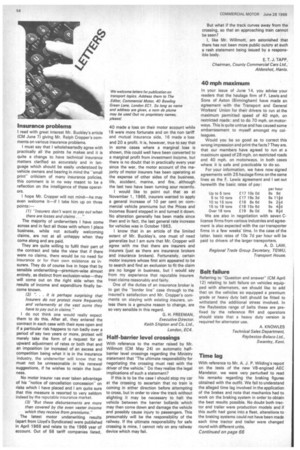Insurance problems
Page 56

If you've noticed an error in this article please click here to report it so we can fix it.
I read with great interest Mr. Buckley's article (CM June 7) giving Mr. Ralph Cropper's comments on various insurance problems.
I must say that I wholeheartedly agree with practically all the points he makes and it is quite a change to have technical insurance matters clarified so accurately and in language which should be easily understood by vehicle owners and bearing in mind the "small print" criticism of many insurance policies, this comment is in no way meant to be a reflection on the intelligence of those operators.
I hope Mr. Cropper will not mind—he may even welcome it—if I take him up on three points :—
(7) "Insurers don't want to pay out when there are losses and claims . . ."
The majority of underwriters I have come across and in fact all those with whom I place business, while not actually welcoming claims, are not at all unhappy when they come along and are paid.
They are quite willing to fulfil their part of the contract and take the view that if there were no claims, there would be no need for insurance or for their own existence as insurers. They do of course live in hope that by sensible underwriting—premium-wise almost entirely, as distinct from exclusion-wise—they will come out on the right side when the results of income and expenditure finally become known.
(2) ". . it is perhaps surprising that Insurers do not protest more frequently and vehemently at the vast sums they have to pay out in claims."
I do not think one would really expect them to do this. After all, they entered the contract in each case with their eyes open and if a particular risk happens to run badly over a period of say two years or more, protest will merely take the form of a request for an upward adjustment of rates or both that and an imposition (or increase) of an excess and competition being what it is in the insurance industry, the underwriter will know that he must not be unreasonable in his renewal suggestions, if he wishes to retain the business.
No motor insurer nas ever taken advantage of his "notice of cancellation concession" on risks which I have placed and I am quite sure that this measure is resorted to very seldom indeed by the reputable insurance market.
(3) "But these disbursements are more than covered by the even vaster income which they receive from premiums." The latest motor underwriting results (apart from Lloyd's Syndicates) were published in April 1968 and relate to the 1966 year of account. Out of 58 tariff companies listed,
We welcome letters for publication on transport topics. Address them to The Editor, Commercial Motor, 40 Bowling Green Lane, London Ed. So long as name and address are given, a nom de plume may be used (but no proprietary names, please)
40 made a loss on their motor account while 18 were more fortunate and on the non tariff and mutual insurance side, 16 made a loss and 20 a profit. It is, however, true to say that in some cases where a marginal loss is shown, this could well have been converted to a marginal profit from investment income, but there is no doubt that in practically every year since the war, the motor account of the majority of motor insurers has been operating at the expense of other sides of the business, life, accident, marine, and fire, although the last two have been turning sour recently.
I would like to point out that as at November 1, 1966, insurers wanted to apply a general increase of 10 per cent on commercial vehicle premiums but the Prices and Incomes Board stepped in and turned it down. No alteration generally has been made since then and in fact, the last general rate increase for vehicles was in October 1963.
I know that in an article of the limited extent of Mr. Buckley's, one must of need generalize but I am sure that Mr. Cropper will agree with me that there are insurers and insurers (just as there are insurance brokers and insurance brokers. Fortunately, certain motor insurers whose first aim appeared to be to search and find an exclusion to fit the claim are no longer in business, but I would say from my experience that reputable insurers treat claims reasonably and fairly.
One of the duties of an insurance broker is to get the "border line" case through to the insured's satisfaction and Mr. Cropper's comments on staying with existing insurers, unless there is a genuine reason to change, are so very sensible in this regard.
G. H. FREEMAN, Executive Director. Keith Shipton and Co. Ltd., London, EC4.
























































































































